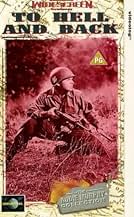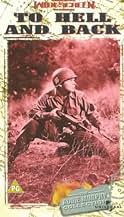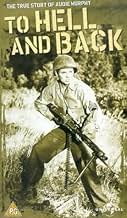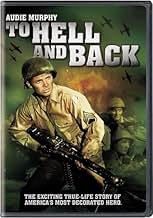NOTE IMDb
7,1/10
6,3 k
MA NOTE
L'histoire vraie d'Audie Murphy, le soldat le plus décoré de l'histoire des États-Unis, pendant la Seconde Guerre mondiale. D'après l'autobiographie d'Audie Murphy qui joue son propre rôle d... Tout lireL'histoire vraie d'Audie Murphy, le soldat le plus décoré de l'histoire des États-Unis, pendant la Seconde Guerre mondiale. D'après l'autobiographie d'Audie Murphy qui joue son propre rôle dans le film.L'histoire vraie d'Audie Murphy, le soldat le plus décoré de l'histoire des États-Unis, pendant la Seconde Guerre mondiale. D'après l'autobiographie d'Audie Murphy qui joue son propre rôle dans le film.
- Réalisation
- Scénario
- Casting principal
- Récompenses
- 1 nomination au total
Avis à la une
I've always Liked watching Audie Murphy's movies since I was a child. I guess it also had to do with the fact that he had that baby face. Being a combat wounded Viet Nam vet, I can relate to his ordeal during and after the war. This man was a caring man who thought of others. Like many other "Medal of Honor" winners; he like the others are not the movie RAMBO hero. They Are "THE REAL McCOYS" It's ironic, though. His last movie in 1971 was called "A time for dying"[A Jesse James movie.] In that same year he died in a small plane crash. A friend of his had once said," all those Germans could not kill him,yet a plane crash near home took his life." My last words are, "May he be with the Lord."
Quite often I see a movie then seek out the book but when I came to the US from Canada when I was 13 the first purchase I made was the paperback version of "To Hell and Back" ($0.35). Of course Audie Murphy is perfectly cast and gives a performance far superior to any of his subsequent movie roles. The others, notably Marshall Thompson, Jack Kelly, David Janssen and Art Aragon give satisfying performances. In many ways this was the "Saving Private Ryan" of its time for its "realistic" portrayal of the foot soldier in WW 2. Life magazine boosted the audience for this film when it put Murphy on the cover and emphasized that the story was true. I think that it works because Murphy doesn't look like the typical movie hero. The book is once again available in a new larger page-size paperback.
During the first World War the American hero out of that conflict, Alvin C. York of Tennessee, had to wait until the outbreak of the second World War for his biographical film to be made. World War II's equivalent from East Texas only waited ten years and had the singular honor of starring in the film of his own life.
Good thing Audie Murphy became a Hollywood star because he got to both write his own story and have Universal Studios produce the film as to his specifications. To Hell and Back is his story, but it's also the story of the men who served with him, those who came back from hell and those who remained.
What I liked best about To Hell and Back was the camaraderie and spirit and the relationships between Murphy and the men of his outfit. The story starts in North Africa where his company arrives too late for the fighting there, but just in time to be part of the offensive to take Sicily. Then it's Salerno, up the western Italian coast and into France with the landings in Southern France until Germany. At each stop Murphy grows in admiration and respect from those over and around him. Such players as Jack Kelly, Paul Picerni, Marshall Thompson and Charles Drake support Murphy very well.
To Hell and Back also shows what a roll of the dice combat is. It could just as easily been Murphy as any of the cast that is killed and doesn't make it to the end of the film. Staying alive is a singular accomplishment. All of these guys are heroes. A lot of the fame and glory Murphy won was due to luck and opportunity and he would have been the first to admit it.
When do you get a film with 100% perfect casting for the lead? you get it in To Hell and Back with Audie Murphy playing the man his comrades called Little Texas. A nice film about the greatest soldier of the greatest generation.
Good thing Audie Murphy became a Hollywood star because he got to both write his own story and have Universal Studios produce the film as to his specifications. To Hell and Back is his story, but it's also the story of the men who served with him, those who came back from hell and those who remained.
What I liked best about To Hell and Back was the camaraderie and spirit and the relationships between Murphy and the men of his outfit. The story starts in North Africa where his company arrives too late for the fighting there, but just in time to be part of the offensive to take Sicily. Then it's Salerno, up the western Italian coast and into France with the landings in Southern France until Germany. At each stop Murphy grows in admiration and respect from those over and around him. Such players as Jack Kelly, Paul Picerni, Marshall Thompson and Charles Drake support Murphy very well.
To Hell and Back also shows what a roll of the dice combat is. It could just as easily been Murphy as any of the cast that is killed and doesn't make it to the end of the film. Staying alive is a singular accomplishment. All of these guys are heroes. A lot of the fame and glory Murphy won was due to luck and opportunity and he would have been the first to admit it.
When do you get a film with 100% perfect casting for the lead? you get it in To Hell and Back with Audie Murphy playing the man his comrades called Little Texas. A nice film about the greatest soldier of the greatest generation.
10valf
To Hell And Back rates as one of the truly classic and unique movies of our time. To have Audie Murphy himself have to remember and "relive" his war experiences, having been removed from them for only ten years, is unprecedented.The movie is the forerunner of such movies as We Were Soldiers Once...and Black Hawk Down. Although Col. Tom Moore was only an on scene adviser he also relived some of the scenes(his own admission) that were depicted in "..Soldiers..." Black Hawk Down depicted actual footage of the battle. The historical and personal accuracy of these movies is tremendous. Audie, however paid a bitter price. His war experiences tormented him the rest of his life with constant insomnia, depression and anxiety. I was lucky enough to meet him at Suffolk Downs Race Track in 1959 or 1960. I always wondered what became of his siblings and sister. Audie Murphy is a true hero of the twentieth century. Everyone should take note of what true character, integrity and loyalty Audie gave us. Thank you Audie.
I liked this movie not so much because it is a great movie ( it is an average war movie of this era) but because it made me reflect about reality versus perception and how you can be very wrong about something by taking it at face value. Let me explain. My perception, If I had to pick a platoon for battle I would never pick Audie Murphy. At 5'5", maybe 110 lbs, a high tinny voice, and hyper-kinetic motion, he seems more like someone that would get killed early and easily, or worse get you killed. The reality, he was the man you wanted in your platoon when the battle started. He was made of heroic stuff. He wasn't a tough talking braggart. He was just a soldier that would do anything to save his brothers and get home alive. He of course isn't the only example of this. He just got his own movie. It was a good thing that he was an actor because John Wayne would have played his part if he hadn't been, which would have been a real shame because you would have lost the true meaning behind the story. Hollywood prefers style over substance. It would have been a true
disservice to all of the short, underweight chirpy men in the world.
Think about Jimmy Stewart and John Wayne, who would you want in your platoon. John Wayne is your probable choice. Now compare Jimmy Stewart's military career with John Wayne's. John Wayne avoided WWII instead using it to advance his career when many of his contemporaries went to war. Jimmy Stewart on the other hand joined the Air Force 9 months before the attack on Pearl Harbor. He had to force the Air Force to let him in because he was under weight. He was a bomber pilot that flew 20 missions. "His wartime decorations included the Distinguished Flying Cross with Oak Leaf Cluster, four Air Medals, and the French Croix de Guerre with Palm." Now who do you want on your side. I'll take the battle hardened, frail looking, stuttering veteran over the tough talking, strapping, strutting Hollywood pretender any day.
So when I watch the movie I think about the reality of Audie Murphy. Which leaves me with the feeling that if you put your heart into it you can do anything. So when you watch the movie think about the reality. You have a 5'5" war hero that actually became a Hollywood action hero which is improbable in itself.
disservice to all of the short, underweight chirpy men in the world.
Think about Jimmy Stewart and John Wayne, who would you want in your platoon. John Wayne is your probable choice. Now compare Jimmy Stewart's military career with John Wayne's. John Wayne avoided WWII instead using it to advance his career when many of his contemporaries went to war. Jimmy Stewart on the other hand joined the Air Force 9 months before the attack on Pearl Harbor. He had to force the Air Force to let him in because he was under weight. He was a bomber pilot that flew 20 missions. "His wartime decorations included the Distinguished Flying Cross with Oak Leaf Cluster, four Air Medals, and the French Croix de Guerre with Palm." Now who do you want on your side. I'll take the battle hardened, frail looking, stuttering veteran over the tough talking, strapping, strutting Hollywood pretender any day.
So when I watch the movie I think about the reality of Audie Murphy. Which leaves me with the feeling that if you put your heart into it you can do anything. So when you watch the movie think about the reality. You have a 5'5" war hero that actually became a Hollywood action hero which is improbable in itself.
Le saviez-vous
- AnecdotesA total of 50,000 rounds of ammunition, 300 pounds of TNT, 600 pounds of blasting powder and ten cases of 40% dynamite were required for the filming of the battle scenes.
- GaffesDuring Audie Murphy's Medal of Honor ceremony at the end of the movie, the narrator makes two mistakes as he describes the other decorations for valor that Murphy received: he mentions "a Bronze Star Medal" (Murphy actually received two BSM's); and "a Bronze Star Medal with bronze service arrowhead" (the correct award is the European-African-Middle Eastern Campaign Medal with Bronze Service Arrowhead). The narrator also omits two significant awards that Murphy earned: two Presidential Unit Citations and the Combat Infantryman's Badge.
- Versions alternativesWest German theatrical version was cut by approx. 5 minutes.
- ConnexionsEdited into The Young Warriors (1967)
Meilleurs choix
Connectez-vous pour évaluer et suivre la liste de favoris afin de recevoir des recommandations personnalisées
Détails
- Durée
- 1h 46min(106 min)
- Rapport de forme
- 2.55 : 1
Contribuer à cette page
Suggérer une modification ou ajouter du contenu manquant



































